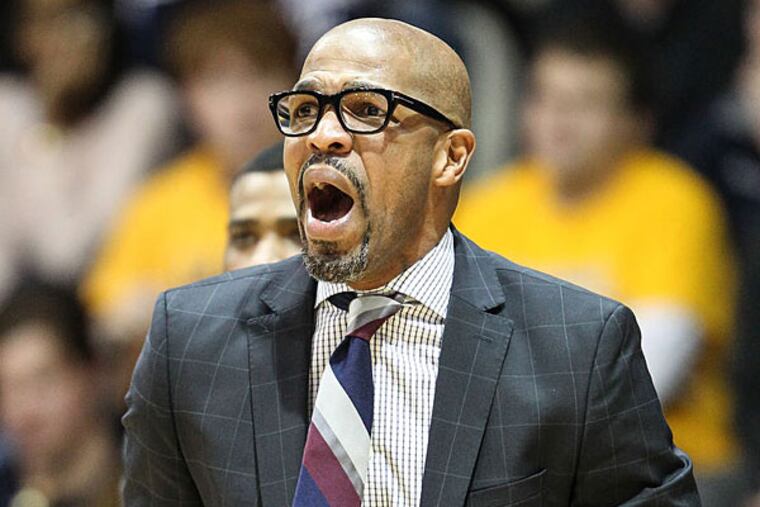Penn athletic department placed on two years of NCAA probation in Jerome Allen scandal
The NCAA penalty, which included a $5,000 fine and recruiting restrictions for men's basketball, stemmed from bribes that former coach Jerome Allen accepted to get the son of a Florida businessman into Penn.

The Penn athletic department was placed on probation for two years and fined $5,000 Wednesday, and its men’s basketball program was assessed recruiting restrictions by the NCAA in connection with recruiting violations committed by former head coach Jerome Allen.
Allen, 47, a former Episcopal Academy and Penn star who coached the Quakers from 2010 to 2015, pleaded guilty and last July was sentenced to probation for accepting $300,000 in bribes from a Florida businessman to get the man’s son into the university’s Wharton School.
The penalty announced by the NCAA Committee on Infractions against Penn also included a 15-year show-cause order against Allen. During that time, a school that employs Allen must restrict him from any duties related to athletics unless it can show why the restriction should not apply.
In the year after the show-cause order expires, any school employing Allen must suspend him for the first 50% of the season if he is employed as a coach, the association said.
Allen is an assistant coach with the NBA’s Boston Celtics.
In addition to probation, the Penn men’s basketball program was assessed a three-week ban on all recruiting from May 10-20 and from May 31-June 10, 2020. The NCAA also reduced the program’s recruiting-person days — days spent recruiting off-campus — for the current academic year by seven. The school noted the probation does not include competitive penalties, so the team will not be banned from postseason play.
In a statement, Penn’s Division of Recreation and Intercollegiate Athletics said that although the NCAA acknowledged that its leadership “exhibited appropriate institutional control and monitoring of its athletics program,” it punished the basketball program even though Allen’s actions were personal and did not give the team a competitive advantage.
“While Penn Athletics and its men’s basketball program accept the penalties handed down by the NCAA,” the statement said, “it is unfortunate that this process did not fully differentiate wrongdoing for personal gain versus wrongdoing for competitive gain in penalizing the institution in addition to the involved individual.”
The NCAA Committee on Infractions report acknowledged that Allen “did not commit the violations to provide a recruiting advantage to the university, but rather … deliberately used his position to influence the admissions process and concealed his conduct for his personal financial gain.”
Allen pleaded guilty in October 2018 on charges connected with accepting bribes that included money, luxury accommodations and trips to Florida from Miami Beach businessman Philip Esformes, who was seeking to get his son, Morris, into Penn.
At Esformes’ trial in April 2019, Allen testified that he lied to the university’s admissions department about the qualifications of Morris Esformes and put him on a list of five high school basketball recruits to ensure his acceptance, putting him ahead of more worthy candidates.
The younger Esformes was admitted as part of the 2015-16 recruiting class but never appeared on the Penn basketball roster.
Allen’s sentence last July included four years’ probation, with six months of house arrest and 600 hours of community service, and a fine of $202,000 as well as an $18,000 forfeiture judgment to the U.S. government.
The NCAA report said Allen’s action “resulted in multiple tryout and recruiting contract violations in addition to accepting the supplemental pay without reporting it as athletically related income while employed at the university.”
The report added that Allen refused to be interviewed by the university or the NCAA enforcement staff and “did not participate in the processing of the case.”
The NCAA said it administered the case through the “negotiated resolution process” because violations and penalties were agreed upon by the association and the university.
Penn athletics said the report indicated that it “promptly acknowledged the violation, accepted responsibility and imposed meaningful corrective measure,” including what it called significant enhancement of procedures for student-athlete recruitment.